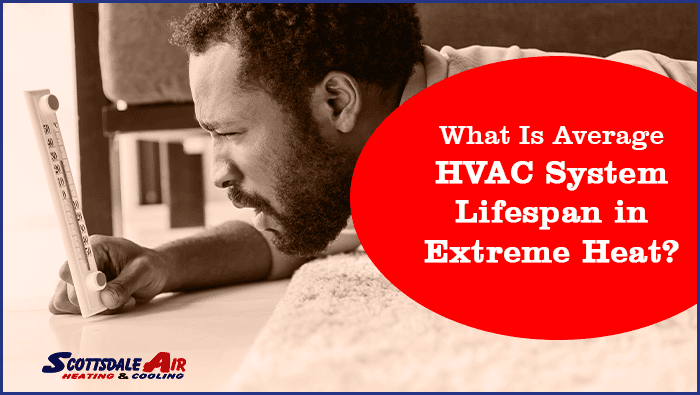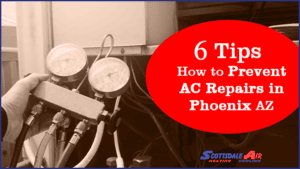Did you know that the average HVAC system lifespan is shorter when used in a hotter climate than in cooler climates?
However, there are some things you can do to extend the life of your system.
If you live in a hot climate, such as Arizona, where the average temperature during the summer is 107, then you may be wondering what an HVAC lifespan in extreme heat is and we’re here to answer that question for you today.
Let’s take a look!
Factors That Affect Your HVAC Units Lifespan
When talking about the average HVAC lifespan, there are a number of factors that you need to consider.
The first, and perhaps most important factor, is the climate that you live in.
HVAC systems tend to last longer when they’re used in cooler climates. This is because the system isn’t working as hard to keep your home cool, which puts less strain on the unit.
Think of it like your car; the more miles you drive, the more maintenance that is needed, and the shorter the lifespan.
The same goes for HVAC systems; the harder they work, the more maintenance they need, and the shorter they will last.
In addition to the climate, there are a number of other factors that can affect how long your HVAC system will last.
The Size of Your Unit
The size of your HVAC unit is also a factor in how long it will last. If your unit is too small for your home, it will have to work even harder to cool your home, which can reduce its lifespan.
On the other hand, if your HVAC unit is too large for your home, it will turn on and off more frequently, which can also reduce its lifespan. This is also known as overturning.
This is why it’s always recommended to have a professional take a look and help you decide on the size you need for your home.
So, next time you need an HVAC replacement or HVAC installation, be sure to call your local experts.
The Maintenance of Your Unit
Another factor is the maintenance and repairs done to your HVAC unit.
Just like your car, if you don’t change the oil or do other routine maintenance, your HVAC system won’t last as long.
If you wait too long to repair issues with your HVAC unit, it can also shorten its lifespan.
So, be sure to keep up with the maintenance of your HVAC system and call for repairs as soon as you notice an issue.
Many HVAC companies will also offer monthly HVAC maintenance plans.
This is a good idea because you’ll know that an expert is coming out every month to ensure that you don’t have any HVAC problems!
The Quality of Your Duct Work
Next, is the quality of your ductwork. Ductwork is an important part of keeping your home cool as it ensures you have cool air running throughout the whole home.
However, if this part of the system is not running properly, it can cause more wear and tear on your unit than needed.
The most frequent issues you’ll see with ductwork are:
- Dirty
- Clogged
- Leaks
- Cracks
These can not only have an effect on your HVAC unit but also on your energy bills!
HVAC Settings
Lastly, we have the settings on your HVAC unit.
In Arizona, you’ll want to try to keep the temperature inside about 30 to 40 degrees cooler than outside, as this is where your unit will run more optimally.
So if it’s 100 outside, you’ll want to set the temp to about 60.
If you set it any lower than this, you could be forcing your unit to run much harder than it should.
Average Lifespan of an HVAC Unit
Now that we have a better understanding of the most important things contributing to the lifespan of your HVAC units, let’s talk about the lifespan.
The average lifespan of an HVAC unit is about 15 to 20 years.
However, if you live in a hot climate and your unit isn’t properly maintained, you may not get 15 to 20 years out of it.
You also may not get that full lifespan if you neglect everything that we just covered in this article.
The more negative effects that your unit goes through, as we mentioned, the more that lifespan will reduce.
HVAC Lifespan in Extreme Heat
So, what about the lifespan of HVAC units here in Arizona, where we have extreme heat?
Here in Arizona, we have extreme heat during the summers, making our units run much harder than most of the country.
However, assuming that you care for your unit properly and have an HVAC professional repair and perform regular maintenance, you can expect your unit to last 12-15 years.
If you’re not sure how old your HVAC system is or if it’s time for HVAC replacement, be sure to contact your local experts.
They will be able to come out and take a look at your unit and let you know what needs to be done.
Prevent AC Repairs in Phoenix
One of the biggest problems here in Phoenix is that people wait too long to call for repairs, which can cause more damage to their units.
It’s important to know the signs you need a new HVAC unit. Some of the most common signs to look out for are:
- Your energy bills have increased
- The cool air isn’t reaching certain parts of your home
- You hear strange noises coming from your unit
- Your home isn’t as cool as it used to be
- You smell something weird or musty from the unit
- There is leakage
Don’t wait until your unit completely breaks down to call for HVAC repair. The sooner you call, the less damage will be done, and the less expensive the repairs will be!
HVAC Lifespan in Arizona
As long as you take care of your unit, you can expect the average HVAC lifespan in extreme heat, such as here in Arizona, to be around 12 to 15 years.
In order to keep your HVAC unit running as optimally and efficiently as possible, you’ll want to make sure that it is well maintained by performing regular HVAC maintenance and repairs.
If you have questions about HVAC or you need maintenance or a new unit, give us a call here at Scotts Dale Air. We’re your local and friendly HVAC pros!
___________________________________________________________________________________________
Are you concerned about your HVAC system making it through another year of extreme Arizona heat? Work with a 5-star HVAC company in AZ you can trust for AC Maintenance or AC Replacement. The team at Scottsdale Air Heating & Cooling has been serving the valley for over 75 years! Call 480-945-7200 or request service online! …*Yes, We DO offer Financing Options.
Read more articles about Heating & Cooling:








